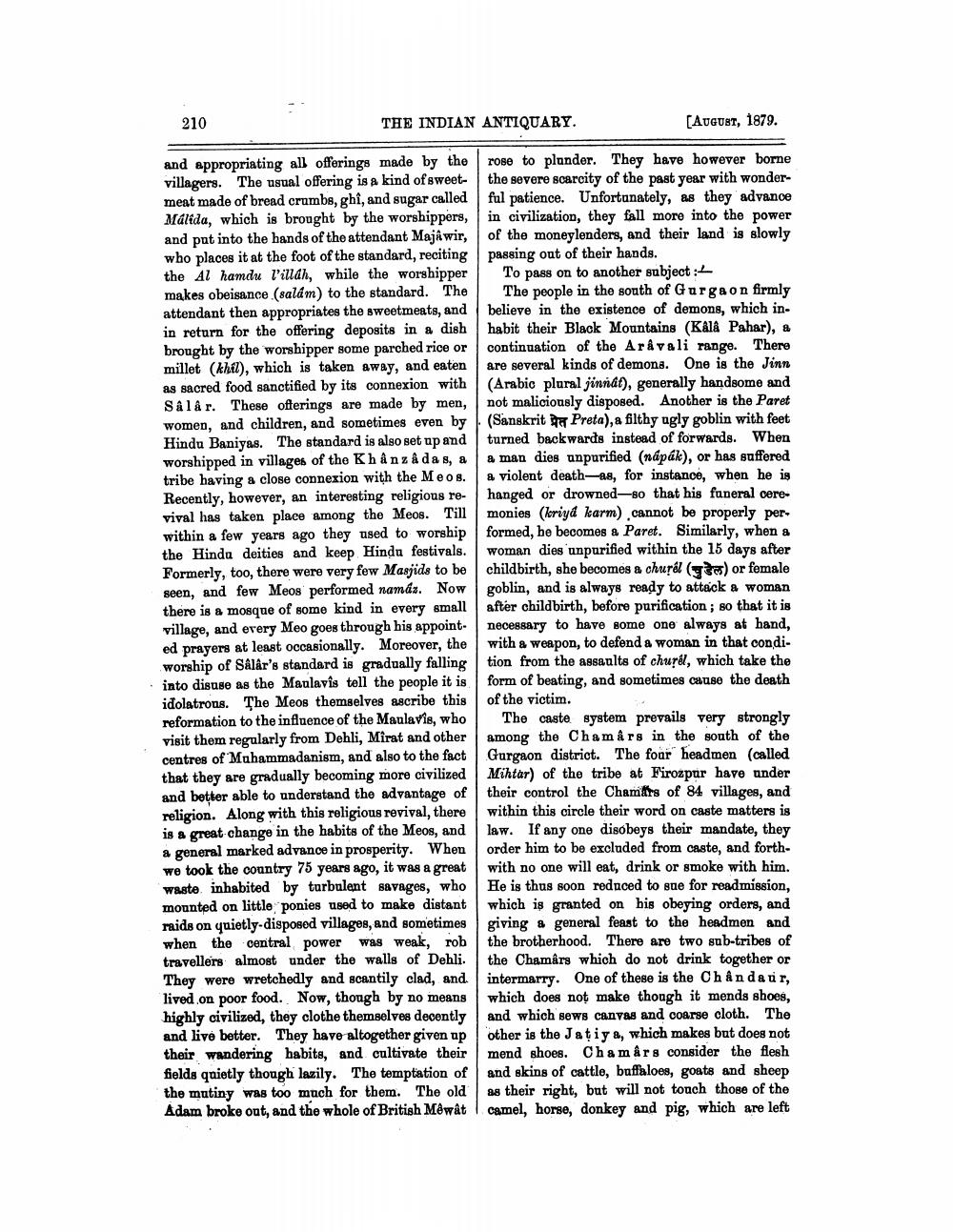________________
210
THE INDIAN ANTIQUARY.
and appropriating all offerings made by the villagers. The usual offering is a kind of sweetmeat made of bread crumbs, ghi, and sugar called Málida, which is brought by the worshippers, and put into the hands of the attendant Majâwir, who places it at the foot of the standard, reciting the Al hamdu l'illah, while the worshipper makes obeisance (salám) to the standard. The attendant then appropriates the sweetmeats, and in return for the offering deposits in a dish brought by the worshipper some parched rice or millet (khil), which is taken away, and eaten as sacred food sanctified by its connexion with Sâlâr. These offerings are made by men, women, and children, and sometimes even by Hindu Baniyas. The standard is also set up and worshipped in villages of the Khânzâdas, a tribe having a close connexion with the Meos. Recently, however, an interesting religious revival has taken place among the Meos. Till within a few years ago they used to worship the Hindu deities and keep Hindu festivals. Formerly, too, there were very few Masjids to be seen, and few Meos performed namaz. Now there is a mosque of some kind in every small village, and every Meo goes through his appointed prayers at least occasionally. Moreover, the worship of Sâlâr's standard is gradually falling into disuse as the Maulavis tell the people it is idolatrous. The Meos themselves ascribe this reformation to the influence of the Maulavis, who visit them regularly from Dehli, Mirat and other centres of Muhammadanism, and also to the fact that they are gradually becoming more civilized and better able to understand the advantage of religion. Along with this religious revival, there is a great change in the habits of the Meos, and a general marked advance in prosperity. When we took the country 75 years ago, it was a great waste inhabited by turbulent savages, who mounted on little ponies used to make distant raids on quietly-disposed villages, and sometimes when the central power was weak, rob travellers almost under the walls of Dehli. They were wretchedly and scantily clad, and lived on poor food. Now, though by no means highly civilized, they clothe themselves decently and live better. They have altogether given up their wandering habits, and cultivate their fields quietly though lazily. The temptation of the mutiny was too much for them. The old Adam broke out, and the whole of British Mêwât
[AUGUST, 1879.
rose to plunder. They have however borne the severe scarcity of the past year with wonderful patience. Unfortunately, as they advance in civilization, they fall more into the power of the moneylenders, and their land is slowly passing out of their hands.
To pass on to another subject:
The people in the south of Gurgaon firmly believe in the existence of demons, which inhabit their Black Mountains (Kâlâ Pahar), a continuation of the Arâvali range. There are several kinds of demons. One is the Jinn (Arabic plural jinnát), generally handsome and not maliciously disposed. Another is the Paret (Sanskrit Preta), a filthy ugly goblin with feet turned backwards instead of forwards. When a man dies unpurified (nápák), or has suffered a violent death-as, for instance, when he is hanged or drowned-so that his funeral ceremonies (kriyd karm) cannot be properly per formed, he becomes a Paret. Similarly, when a woman dies unpurified within the 15 days after childbirth, she becomes a churél () or female goblin, and is always ready to attack a woman after childbirth, before purification; so that it is necessary to have some one always at hand, with a weapon, to defend a woman in that condition from the assaults of churel, which take the form of beating, and sometimes cause the death of the victim.
The caste system prevails very strongly among the Chamârs in the south of the Gurgaon district. The four headmen (called Mihtar) of the tribe at Firozpur have under their control the Chamars of 84 villages, and within this circle their word on caste matters is law. If any one disobeys their mandate, they order him to be excluded from caste, and forthwith no one will eat, drink or smoke with him. He is thus soon reduced to sue for readmission, which is granted on his obeying orders, and giving a general feast to the headmen and the brotherhood. There are two sub-tribes of the Chamârs which do not drink together or intermarry. One of these is the Chân daur, which does not make though it mends shoes, and which sews canvas and coarse cloth. The other is the Jatiya, which makes but does not mend shoes. Chamârs consider the flesh and skins of cattle, buffaloes, goats and sheep as their right, but will not touch those of the camel, horse, donkey and pig, which are left




